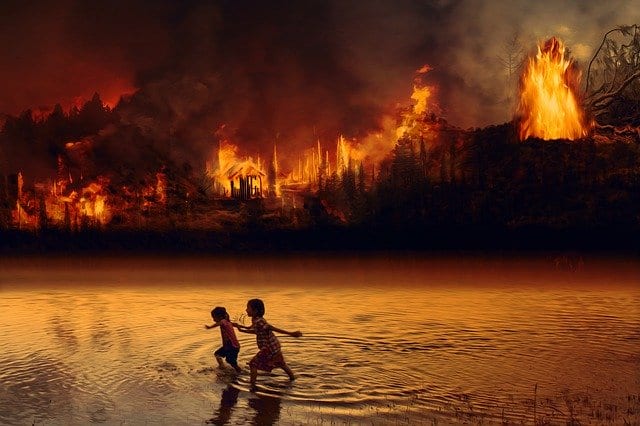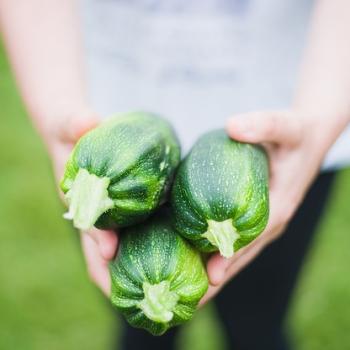
I’ve seen a lot of people balking at the idea of a “sin against ecology” lately. Our Holy Father has mentioned adding “ecological sins” to the catechism, and I’ve noticed people acting as though this is something new– a great big change totally out of left field for Catholicism. How can someone sin against ecology?
But it’s not terribly difficult to me, to think about what a sin against ecology might be. It seems to follow from what we know already.
We’re Catholics, after all. We already know that our physical bodies and the creation we live in matter. We don’t just pray and meditate with our minds; we use our bodies in worship. Our sacraments involve outward signs from the created world like oil and water and bread. We have rules about the colors of vestment the priest wears based on the liturgical season, the materials out of which we can make chalices, and the physical shape of our altars– they have to have four corners, for the four corners of the earth. The Mass draws us up to Heaven, but it also takes place on Earth just as the Crucifixion of Christ did– indeed, we’re revisiting the Crucifixion, that junction between Heaven and Earth, every time we go to Mass. We calculate our liturgical year based on the seasons going on in nature and the movement of the earth around the sun: a vigil begins after sunset, Easter falls on the first Sunday after the first full moon on or after the vernal equinox. We bring flowers and palm branches to church and walk out wearing ashes, based on the seasons. We have rules about when to fast, when to abstain from meat, when we have to leave our houses and go to church, what way it’s okay to have sexual intercourse and with who. The physical world was created by God on purpose, God loves it, and we are part of it. What we do in the physical world matters. That’s Catholicism.
It’s nothing new or scandalous to say that you can sin against the environment, against the world you live in. And it’s easy to see why when you consider that all human beings live on the earth. Remember, we as Catholics are supposed to believe that our neighbor is “another self,” someone we’re supposed to love as we love our own selves. If we choose to hurt our neighbor because it’s inconvenient not to, we commit the sin of sloth. If we choose to hurt our neighbor so that we can have a luxury or a treat we want, we commit the sin of greed. This has always been our teaching.
How would you feel if your next door neighbor helped herself to your vegetable patch without asking whenever she wanted a snack, leaving none for you? What if she dumped trash all over your yard and poisoned your pets, or your children? What if she started cutting down your carefully cultivated ornamental trees? What if she started burning her garbage in her backyard at all hours of the day, and you couldn’t enjoy being outside in your yard without getting sick?
Now, remember that, according to our faith, everyone is our neighbor. Physical proximity isn’t what determines whether we have to love someone as we love our own self. Being in the same country, culture or race isn’t what does it. Our mere shared humanity does it. In many cases we might find ourselves having more responsibility for the person on our doorstep than the person living far away because that’s all we can be expected to do as finite humans, but that doesn’t mean we’re allowed to disregard the well-being of humans far away. They are our responsibility. We are all each other’s responsibility, and insofar as we can avoid hurting them, we must avoid it or we sin.
And the terrible truth is that the things we do, here in industrialized and wealthy countries like the United States, are hurting our neighbors all over the world. Our way of life right now actually is stealing our neighbors’ food, poisoning their air, dumping trash in their yards. We are poisoning their children and pets– everyone’s children and pets. We are blowing smoke in their air. People just like us, as unique as we are and whom God loves as much as He loves us, are suffering because of the choices our society has made. People find themselves having a harder and harder time growing nutritious food. They have a harder and harder time breathing clean air. They are getting sick from the water they need to drink and bathe in to survive. People who experience the majesty of God by gazing at the stars or walking in the woods or enjoying the company of animals, are finding that the stars are dimmed by pollution, the woods are getting smaller, and the animals are disappearing.
Insofar as we have choices about this, these are not morally neutral actions. We’re hurting our neighbor, and we need to repent and stop.
The Catholic church is not adverse to science. Catholics, as we were all told in Catholic school, invented the Big Bang theory and the science of genetics; Catholics are allowed to believe in evolution and things like that. We’re not Luddites opposed to new science, the way some Evangelicals are; we are people who incorporate advances in the sciences into our understanding of the world God created, and used them to help make ethical choices. Catholics believe in using the sciences to understand and improve our lives. To help us understand and improve our relationship with our neighbors all over the world, we need to consult the scientists who study ecology and the climate. True, these scientists are fallible. They don’t know everything, and they often change their theories based on new information. But they do the best they can based on the information they have: and the general consensus among such scientists these days, is that the earth is on the brink of an ecological catastrophe which will cause suffering for everyone, for all of our neighbors near and far, if we don’t do something fast.
This isn’t a crisis that can be averted just by turning off the water when you brush your teeth and ordering that weird sippy lid at Starbuck’s– though that’s one of the things I’m doing just in case it helps. It especially can’t be solved by insisting that the most helpless among us make the biggest sacrifices: by saying that disabled people will have to chip their teeth on metal straws and people with asthma can’t have inhalers anymore, or things of that nature. I keep seeing those issues discussed, but they’re not going to work. First of all, it’s totally unjust to point the finger at helpless people and insist they make their crosses even heavier so that we can go on living as we wish. Secondly, it’s a red herring. If all the straws and inhalers in the world disappeared today, we would still be on the verge of an ecological catastrophe.
Instead, we’re going to have to insist that the most powerful people in our society, the people with the most choices, make drastic changes to the way their industries manufacture and transport products and dispose of waste. We are all going to have to be willing to accept changes in our own lives that result from the massive changes being made above our heads. I don’t know how those changes will affect our lifestyles. There’s a great deal of scaremongering going on about how these changes will make us all completely miserable and I don’t think that’s true, though I’m sure we’ll be inconvenienced especially at first. But we’re Catholic. We ought to be used to the idea that sometimes, choosing not to commit a sin that hurts our neighbor is inconvenient and requires sacrifice– but it’s our responsibility to choose rightly anyway. Just ask an NFP coach or the person they get to lecture teenagers on chastity about that. This is right in our wheelhouse. We already know how to accept inconvenience for the sake of doing the right thing. We ought to be better at this than everybody else, not stubbornly insisting on being worse.
If you choose to do something that you know will hurt your neighbor, you sin. That’s always been Catholic teaching and it goes back before Catholicism to the Old Testament as well. Choosing to hurt your neighbor so that you can live as you wish is a sin. Thanks to advances in the sciences, we now know other ways in which our lifestyles might be hurting our neighbor, and we have to repent of those and choose differently even when it’s not much fun. Not to do so would be the sins of sloth and greed. That’s not a brand new bizarre wrinkle being introduced to Catholic teaching; it’s just applying our teaching to new information.
There’s no reason in the world we should be afraid to apply teaching to new information. This is just another way we’re called to live in harmony with our neighbor in the world God created. Sins against ecology are nothing new, and neither is our need to repent.
(image via Pixabay)
Steel Magnificat operates almost entirely on tips. To tip the author, visit our donate page.













